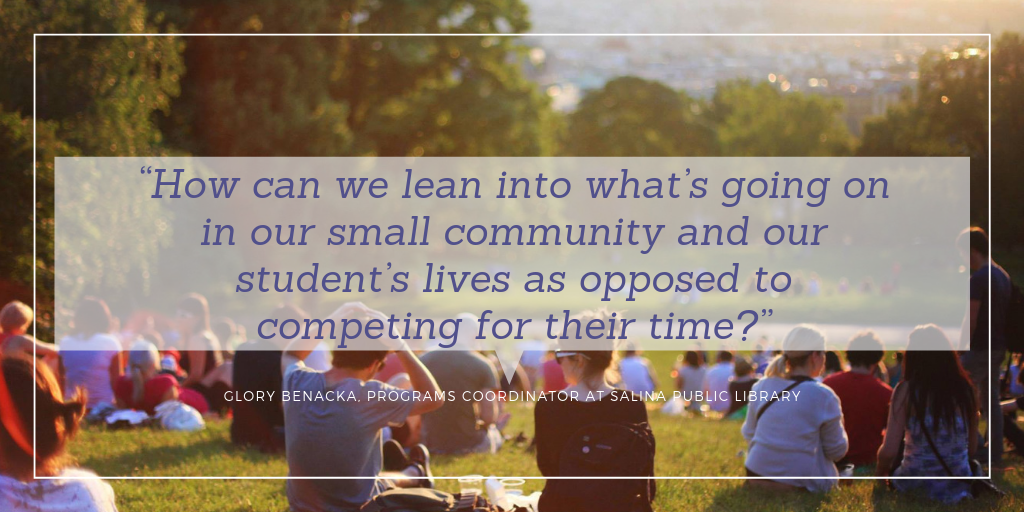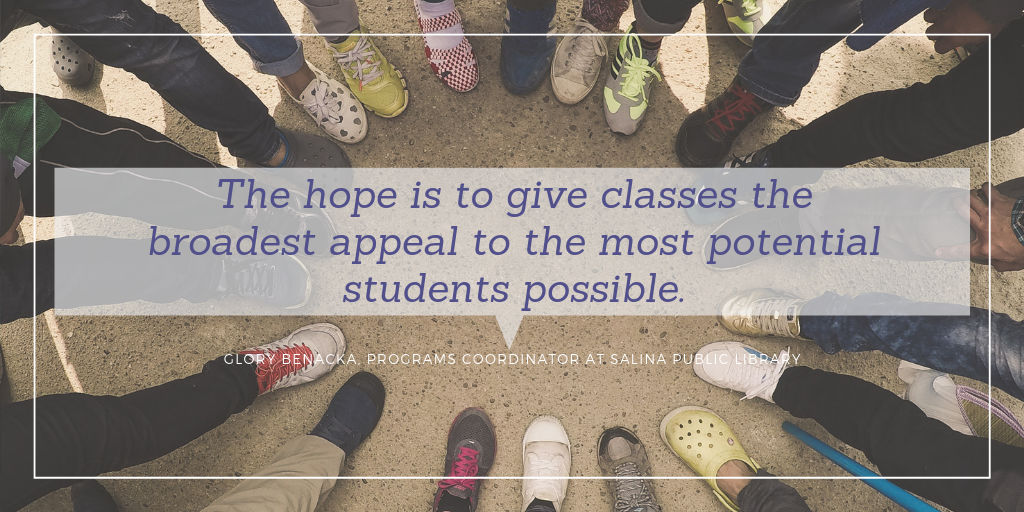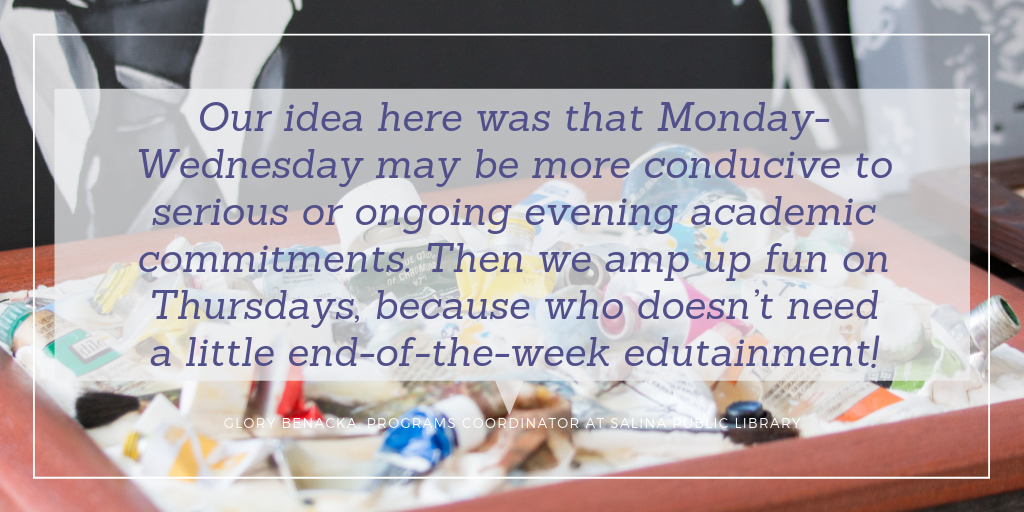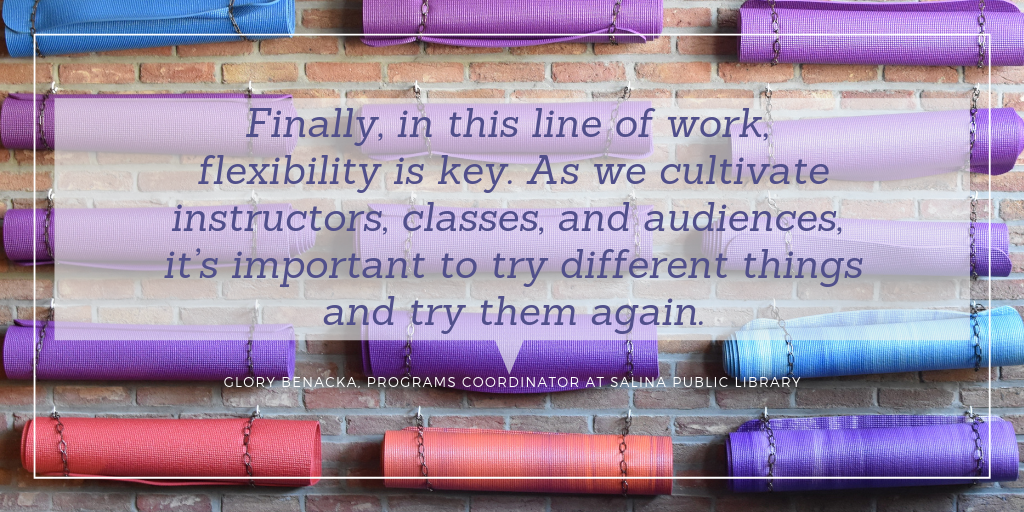Grow Your Program
Program Spotlight
Finding Time in the 24/7 Learning Environment
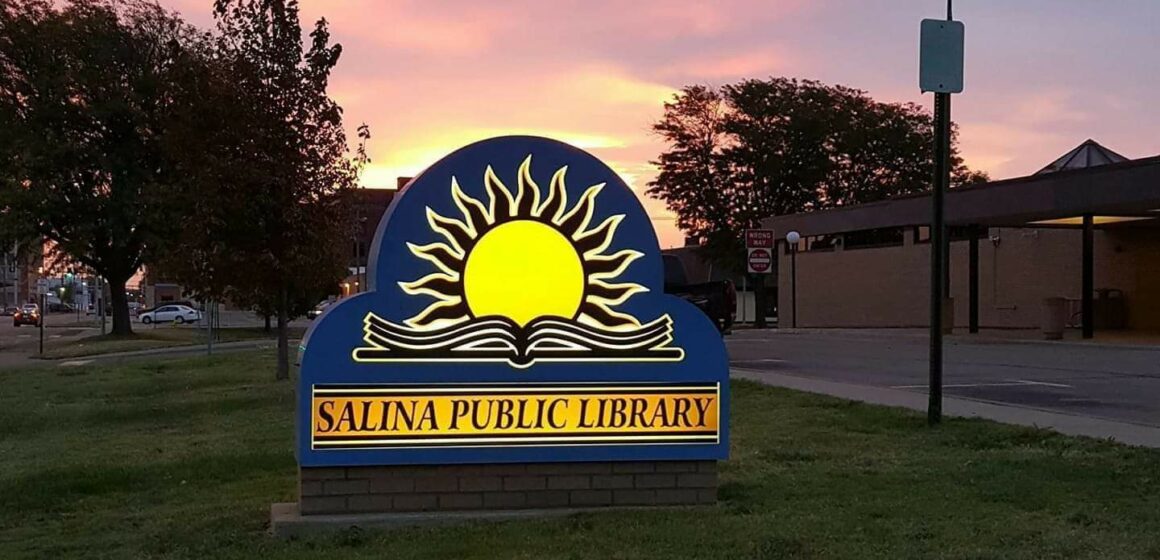
Welcome to our very first guest post on the CourseStorm website! (And we cannot express how excited we are about it!)
If you run an education program that draws from a rural population, you’re in good company. Today, we share advice from a super-successful program in Salina, Kansas. Salina sits in the middle of wheat country alongside the Smoky Hill River, and with a population of about 47,500, isn’t a big city but is certainly a regional hub of activity. As part of the Central Kansas Library System, Salina Public Library‘s CLASS program serves mostly students from Salina but also attracts people from rural parts of the region seeking adult learning and community education opportunities.
Since their founding in 2002, they’ve uncovered a scheduling methodology that prevents low enrollment, supports students, and is encouraging of their community. We invited Glory Benacka, Programs Coordinator at Salina Public Library, to write about how their thriving CLASS program creates and refines its schedule based on students’ requests, observations, and what’s happening in the community at any given time.
Finding Time in the 24/7 Learning Environment
Like any other office across the country coordinating lifelong learning opportunities for adults, when registration opens I nervously await the results of which classes fill up, hoping that we hit a few home runs and that every class meets its minimum. I am a Programs Coordinator, balancing the many day-to-day details of a robust adult learning program, CLASS at Salina Public Library in Salina, KS. There’s nothing worse in this line of work than doing all of the behind-the-scenes work for a class that doesn’t come to fruition due to low enrollment. Especially when it’s not because the topic is uninteresting, but due to the fact you scheduled it on the day everyone’s going to a street fair, graduation, or watching a football game.
In any given year we may offer up to 100 classes, so there are a lot of seats to fill each semester. When our program began as a community initiative in 2002, adult learners in Salina were seeking opportunities to pursue classes on just about anything from floral arranging, writing, and foreign language, to cemetery tours, self-defense, and ham radio.
One of the most significant changes between then and now is that as our program matured, so did other community class offerings. Today the competition for the average adult’s time is fierce. There are more local organizations doing programing and a cottage industry of evening craft classes has sprung up in Salina over the past few years. The advent and proliferation of home streaming media services and endless internet content further divide our audience’s time. There is so much to learn anytime, anywhere! As we approached scheduling our fall 2019 CLASS semester, the question arose, “How can we lean into what’s going on in our small community and our student’s lives as opposed to competing for their time?”
Fun & Happy Weekends
Leaning into our community meant being open to partnerships. Sometimes working with partnerships leads to funky scheduling choices. When we first partnered with our regional Confucius Institute group, we went with the path of least resistance, which was an Introduction to Chinese Language class on Friday evenings 6-7 p.m. We had three students. Upon reflection, we noted that even our own place of work, Salina Public Library, has shortened hours on Fridays —we close to the public at 6 p.m.! Friday evenings are the beginning of the weekend for most people. Knowing that many of our students are weekend travelers, DIYers, or just busy and tired adults, Friday night is not the best time to go to a Chinese Language class. We were limiting the class’ audience. We had done a great deal of extra advertising early on, and we felt there was community interest in learning Chinese, but enrollment was low.
So the next semester we tried Beginning Chinese Language on a Wednesday night instead. Voila, 12 students! In approaching future classes, I even asked the Chinese language instructor if we could stretch class time to two hours instead of one, like our Spanish language courses. She politely explained that for a pictorial language and adults, one hour is the common saturation point for new Chinese language students. This hit home as another reason Friday night Chinese was a no-go. Surely it’s hard for adults to take on a subject at the end of their week that requires so much brainpower! This was also a great example of the back and forth conversation necessary with experienced instructors and students to create the best scenario for a class. It’s important to listen to the numbers and observe student registration behaviors.
As a result of our no-Chinese-Language-on-Fridays discovery (we had tried to offer several other classes with low enrollment on Fridays that same semester), for our fall semester, we decided to nix the night altogether. This is a bonus for our hard-working staff, who can now always plan to have that evening with family and friends. Further, as the library closes at 6 p.m., we aligned ourselves better with our organization’s schedule. In bigger organizations, there are typically very good reasons for opening hours that may be a great indicator of when people in your community are and aren’t active and available for learning pursuits. We don’t need to compete for our student’s Friday night fun time. Let them start their weekend!
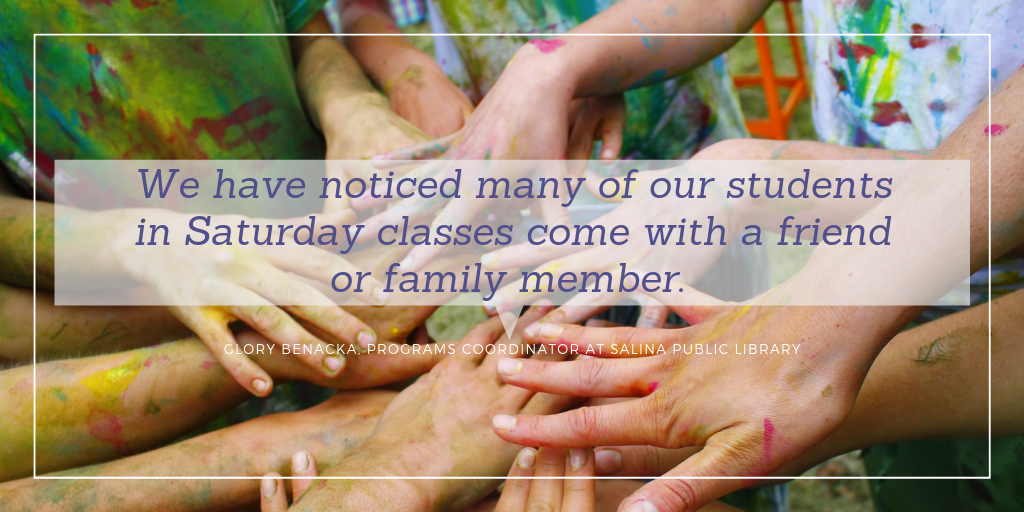
Looking at our fall 2019 semester scheduling we also realized that Sundays are typically a busy church and family day in our community. Our downtown, where we are located, is quiet and most shops are closed. The library’s Sunday hours are 1-6 p.m., which also reflect our community’s culture of Sunday as a quieter family fun day. We decided to not schedule any of our classes on Sundays this fall in light of this trend. This isn’t to say we’d never offer a Sunday afternoon class, but if we chose to, there would need to be a strong purpose or intention for Sunday classes.
Our fall Saturday offerings are strategic too. Most of our Saturday classes are brief and held in the late morning, like Guided Meditation on three Saturdays over three months from 10-11 a.m. A handful of one-time workshop-style longer classes like Basic Sculptural Welding and AARP Smart Driver are being offered on Saturdays for weekend warriors. We have noticed many of our students in Saturday classes come with a friend or family member. Saturday classes, we hope, include a social opportunity.
Community Blackout Dates
In Salina and the small towns around it, we have a few times of the year where, frankly, everyone, their brother, mother, dog, girlfriend, etc. is at “insert here” annual event. We decided that though the library is open year-round (besides major holidays), CLASS could refine it’s scheduling by not offering classes during times that would compete with major community happenings. Popular annual events such as the Smoky Hill River Festival in June and the Smoky Hill Museum Street Fair every September, rain or shine, draw big crowds. Not only do many of our students attend these annual events, but many staff also participate, both as spectators and volunteers. When the community says ‘all hands on deck’ it’s a good time to let our adult learners take a break. We’ve started making these times throughout the year CLASS-blackout dates. In a smaller community like ours, I think it’s not only practical to share your audience’s time resources, but it’s also a kind gesture to other community organizations that says, hey your event is important, and it’s your turn to shine!
In addition to following community calendars and events through the local newspaper, radio stations, and social media, we also take into consideration popular regional sports schedules, national events, and holidays. On major U.S. holidays, when the public library is closed, we do not schedule classes. We also try to be conscientious of scheduling around Christmas and Thanksgiving when everyone’s super busy. We’ve found lower enrollment rates during these big seasonal holidays. We also take into consideration some popular team sports schedules on Saturdays avoiding conflicts with major home games when possible. The hope is to give classes the broadest appeal to the most potential students possible. No excuses!
Learning Monday-Thursday
With Friday nights freed up, restricting Saturdays to fun workshops and not offering classes on Sundays … you’re probably asking, what’s left? For our fall semester, which runs roughly Aug. 1-Oct. 31, Mondays-Wednesdays are when the bookish classes and clubs have been scheduled.
Our multi-session classes usually run five consecutive times. The class may continue to meet as a second series, but we’ll list it as 1 and 2, with each being a five-week increment. We are experimentally modeling some of our ongoing classes—like chess as a club—and structured the schedule similar to how our exercise classes run. This will allow students to sample something new with a lower initial investment. They can try the first five weeks and see if they like it as opposed to a bigger initial 10-week commitment. It’s also budget-friendly as you could enroll for each separately. These regular class offerings are balanced with a few shorter class runs such as a 4-part writing workshop in October on Tuesdays.
We turned to students requests to guide the specific time the class is offered too. Chess is on Tuesday evenings starting at 6 p.m., which some interested students requested, instead of the 5:30 p.m. start of previous semesters. Now those students who get off work at 5 p.m. have time to grab a bite to eat and relax for a minute before coming to play chess for an hour and a half. We’ve attempted to put lighter classes, one-time classes, and entertaining classes on Thursdays when possible. Thus, a coin collecting class, Pinterest Night, and some one-time painting craft classes that may have a social student draw, have been scheduled on Thursdays. Our idea here was that Monday-Wednesday may be more conducive to serious or ongoing evening academic commitments. Then we amp up fun on Thursdays, because who doesn’t need a little end-of-the-week edutainment!
Finding adult classes anywhere can be a tricky adventure. Most local colleges and universities classes follow standard M-F daytime schedules catering to 20-something students who work part-time. Our audience includes a healthy base of baby-boomer students, but we also attract families, home-schoolers, and anyone 16+ looking for affordable, fun, and interesting lifelong learning opportunities after a typical workday.
Accommodating by Design
Discoveries that have led to our fall semester’s schedule have included conversations with students. When someone is interested or suggesting a class, I always try to ask what day and time would you take that? Further, tracking attendance, even simply by observation or chatting with instructors is another great way to find indicators of what’s working or not.
Most importantly, being responsive to the community’s culture of leisure activities, family time, holidays, and comparing calendars with other institutions are great pathways for scheduling adult classes that accommodate busy schedules.
Finally, in this line of work, flexibility is key. As we cultivate instructors, classes, and audiences, it’s important to try different things and try them again. People, trends and communities are continuously changing, and it’s important to keep engaging and being responsive to find what works best when and where you are.
 Glory Benacka is Programs Coordinator at Salina Public Library.
Glory Benacka is Programs Coordinator at Salina Public Library.
Glory is from Nebraska and holds a B.A. in Visual Art from Eckerd College in St. Petersburg, FL. With a passion for lifelong learning, she enjoys spending free time reading, writing, learning languages and taking photographs. Outdoors she is a modern homesteading enthusiast with two energetic dogs who take her for walks.
Glory can be reached at programs.glory@salpublib.org.

Nic Lyons
Nic is skilled in scaling start-up edtech and education organizations to growth-stage success through innovative marketing. A former journalist and copywriter, Nic holds a postgraduate certificate in digital and print publishing from Columbia University School of Journalism's publishing course.

